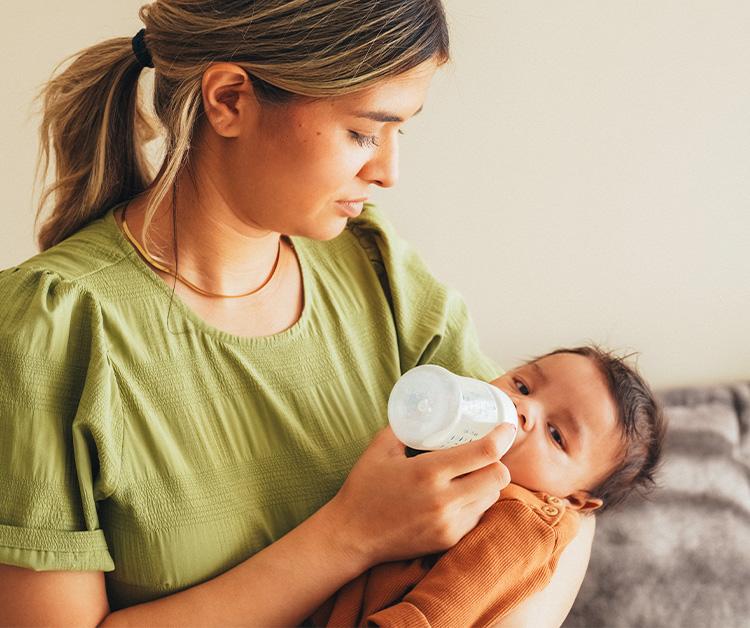No Enfamil products are affected by the recent recall initiated by another manufacturer. Learn more about our quality standards.

Did you know there are good bacteria that live inside our bodies? Those good bacteria are called probiotics, and their communities grow inside our bodies before birth. Prebiotics are foods that feed good bacteria and support their communities that live inside our gut. Let’s show you how you can support your baby’s good bacteria!
Your baby’s tummy is still learning how to do its job. In the first months of life, their digestive system and immune system are developing right alongside each other—and the good bacteria in their gut play an important role in both. When those bacteria are in balance, it can mean less tummy trouble, better nutrient absorption, and a stronger foundation for your little one’s overall health.
Think of probiotics as the friendly helpers working inside your baby’s gut and prebiotics as the nourishing food that keeps those helpers thriving. Together, they make a team that supports comfort, growth, and wellness from the inside out.
| Probiotics | Prebiotics | |
|---|---|---|
|
What they are
| “Good” bacteria that help keep your baby’s tummy balanced and support digestion. We all have probiotics that live in our gut throughout our entire lives! | Special fibers that feed and nourish the good bacteria already living in your baby’s tummy—and yours! |
|
What they do
| Help break down food and provide the body with more nutrients. | Feed the friendly bacteria so that their populations grow stronger, making them more effective at keeping the gut balanced. |
|
Where they come from
| Babies are born with probiotics in their gut that largely come from their mother’s diet. Babies may continue to get probiotics from breastmilk, and/or formula that has added probiotics. Adults can get probiotics from supplements and/or fermented foods such as kimchi, yogurt, and sauerkraut. | Babies can get prebiotics from baby formulas that include added prebiotics, and/or common baby foods such as infant cereals, bananas, or other fruits and vegetables. Adults can get prebiotics from supplements or from high-fiber foods including greens, whole grains, and beans. |
|
Think of them as
| The helpful houseguests that move in and lend a hand. | The food that helps those helpful houseguests stay strong and happy. |
When your baby’s gut bacteria are supported, you may notice real-life differences: stools that are softer and easier to pass, less tummy discomfort, and fewer tears during diaper changes. These small improvements in digestion can make a big difference in your baby’s immediate comfort.
In a clinical study1↗, babies who had hard or infrequent stools and were fed a gentle formula with partially hydrolyzed protein and prebiotics had:
Supporting your baby’s microbiome doesn’t just help balance what’s happening on the inside—it helps them (and you) feel more comfortable day to day.
Some babies go through periods of fussiness, gas, or even hard stools as their tummies adjust to feeding. That’s when the right formula can make a big difference. Enfamil NeuroPro Gentlease now has our PDX & GOS prebiotic blend—special nutrients that help feed the good bacteria in your baby’s tummy. This gentle blend is designed to ease stooling discomfort and support softer, more regular stools, so your little one can feel more comfortable.
Gentlease also has partially-broken-down proteins and important nutrients like DHA to help support your baby’s growing brain. That means your little one is getting the comfort they need and the nourishment to grow strong and healthy.
Whether your baby is formula-fed or combo-fed, Enfamil NeuroPro Gentlease is designed with tiny tummies in mind. It’s easy to digest, gentle on sensitive stomachs, and gives you peace of mind knowing you’re supporting your baby’s comfort and development.
Every baby is unique, and what works best for one may look a little different for another. The good news? You don’t have to figure it out alone. Enfamil Family Beginnings® was created to support you and all the parents in our community with expert-backed articles, feeding tips, and resources; plus countless ways to save on Enfamil purchases. Think of it as a partner on your parenting journey, helping you feel confident in nurturing your baby’s healthy beginning.
References:
1Fabrizio V, Harris CL, Walsh KR, Wampler JL, Zhuang W, Wu SS. Softer More Frequent Stools in Infants With Difficult Stooling Fed Hydrolyzed Protein Formula With Added Prebiotics: Randomized Controlled Trial. Front Pediatr. 2022;10:894626. doi:10.3389/fped.2022.894626
All information on Enfamil, including but not limited to information about health, medical conditions, and nutrition, is intended for your general knowledge and is not a substitute for a healthcare professional's medical identification, advice, or management for specific medical conditions. You should seek medical care and consult your doctor or pediatrician for any specific health or nutrition issues. Never disregard professional medical advice or delay seeking medical treatment, care, or help because of information you have read on Enfamil.